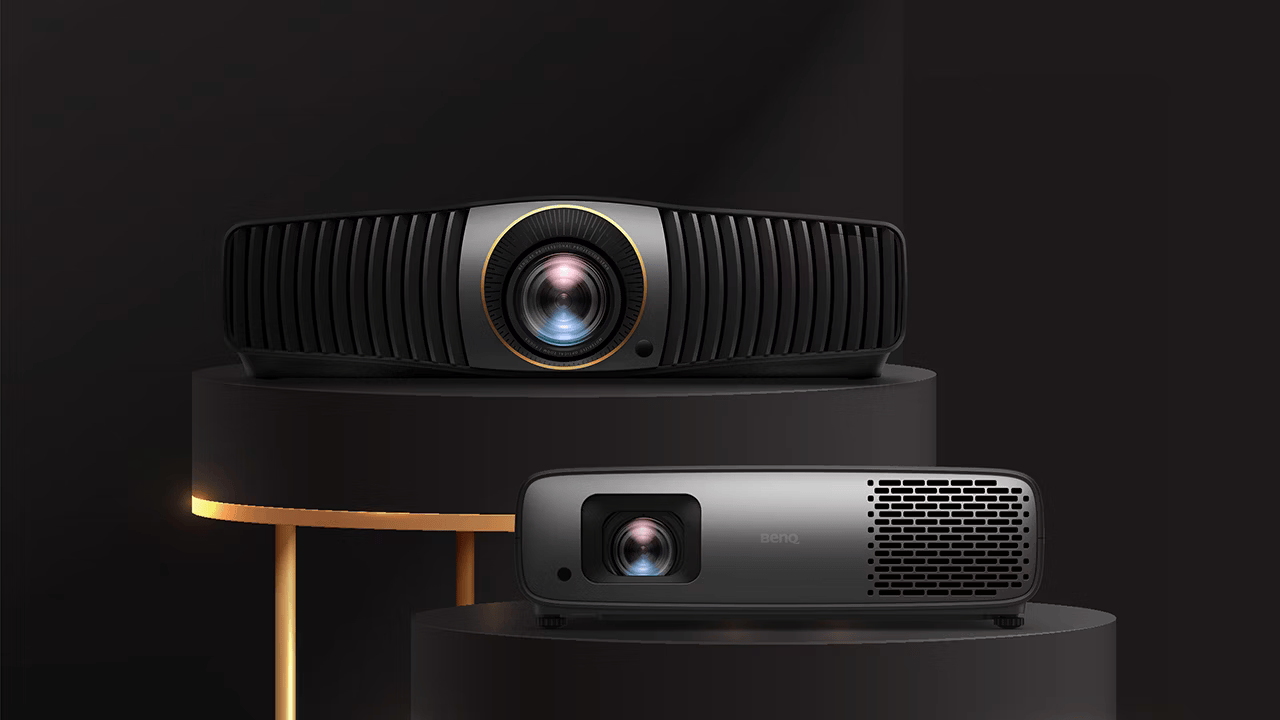What Hi-Fi? Verdict
This smart and entertaining projector with built-in audio will suit those looking for a simple home cinema solution
Pros
- +
Excellent sound for a projector
- +
Bright picture with punchy colours
- +
Decent motion handling
Cons
- -
Missing key apps
- -
Poor black detail
- -
Some rainbow issues
Why you can trust What Hi-Fi?
If you’re on the hunt for convenient and accessible home cinema solutions, ultra-short-throw (UST) projectors such as the Xgimi Aura can seem like an obvious choice.
With built-in sound and streaming capabilities, these smart projectors can simplify a home theatre set-up, instantly eliminating extraneous cables, soundbars and streaming dongles. Thanks to advanced lens technology that allows them to throw huge images from short distances, UST projectors altogether remove the need for complicated installation or rear positioning, extending the possibility of giant cinema screens to those in smaller homes.
But with AV, as with just about everything from food to home working, convenience can be a double-edged sword, and what UST projectors give with one metaphorical hand, they taketh away with the other.
Those specialised lenses are pricey and, unfortunately, don’t yet deliver the overall picture quality you’d expect from an equivalently priced conventional long-throw model. And then there’s positioning which, while easy in theory (just plonk it on a sideboard near an empty wall and power socket), can actually be fairly involved in practice.
With all of that in mind, it's remarkable that the Xgimi Aura puts in a thoroughly entertaining big-screen performance that’s more impressive than the sum of its parts and almost makes us forget its flaws.
Price
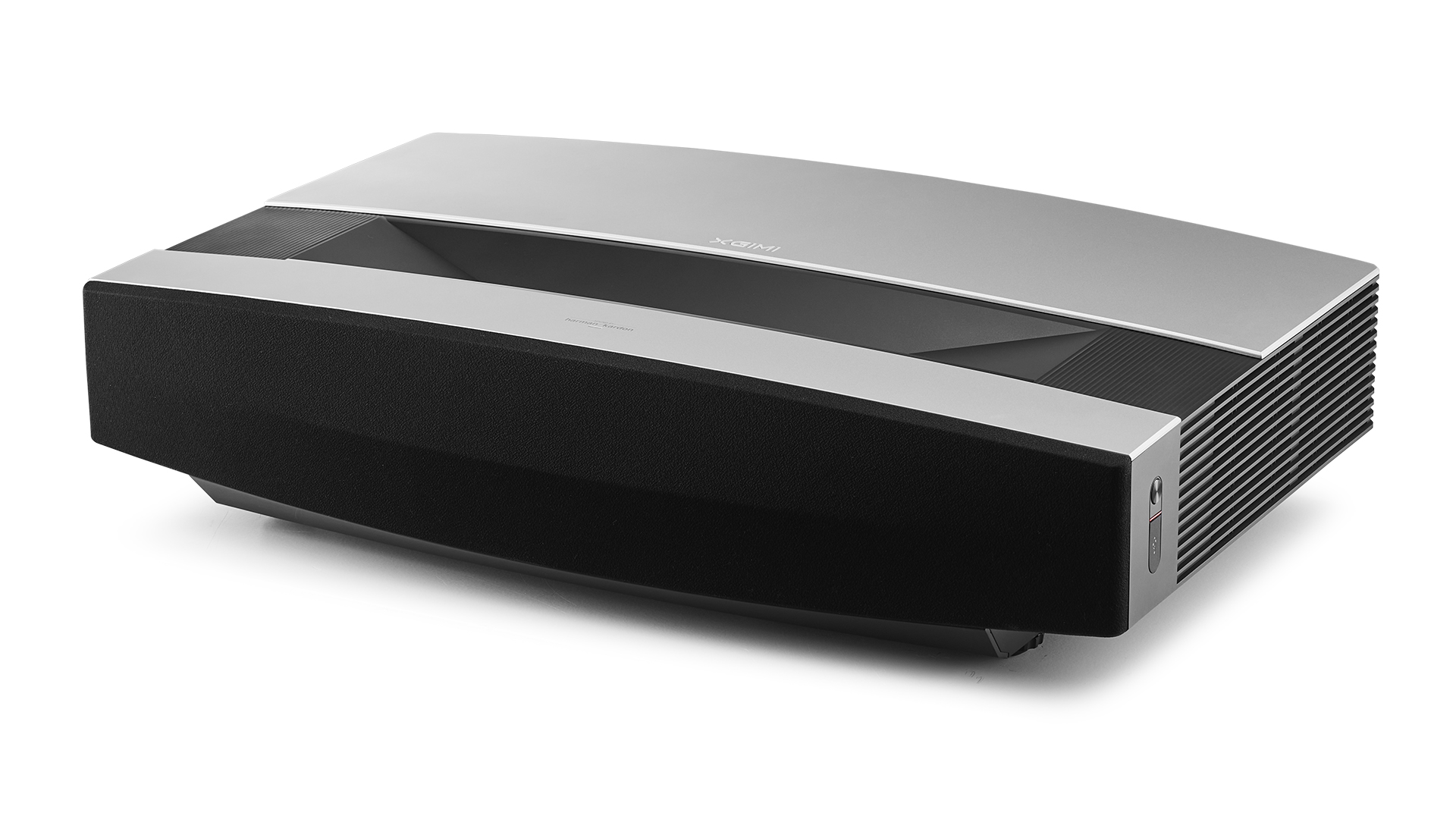
At £2149 / $2499 / AU$3999, the Aura is within the same price bracket as our reference mid-range long-throw model, the Epson TW9400 (£2500 / $3999 / AU$4999).
While it’s not cheap by any means, the Aura is considerably more affordable than most other similarly sized and specced 4K laser ultra-short throw models such as the BenQ V6050 (£3999 / around $5222 / AU$7220) and Samsung LSP9T Premiere (£3999 / $6499 / AU$8999). It stands as the flagship model in Xgimi’s range of mainly compact and portable projectors, but petite and mobile the Aura certainly is not.
Features and build
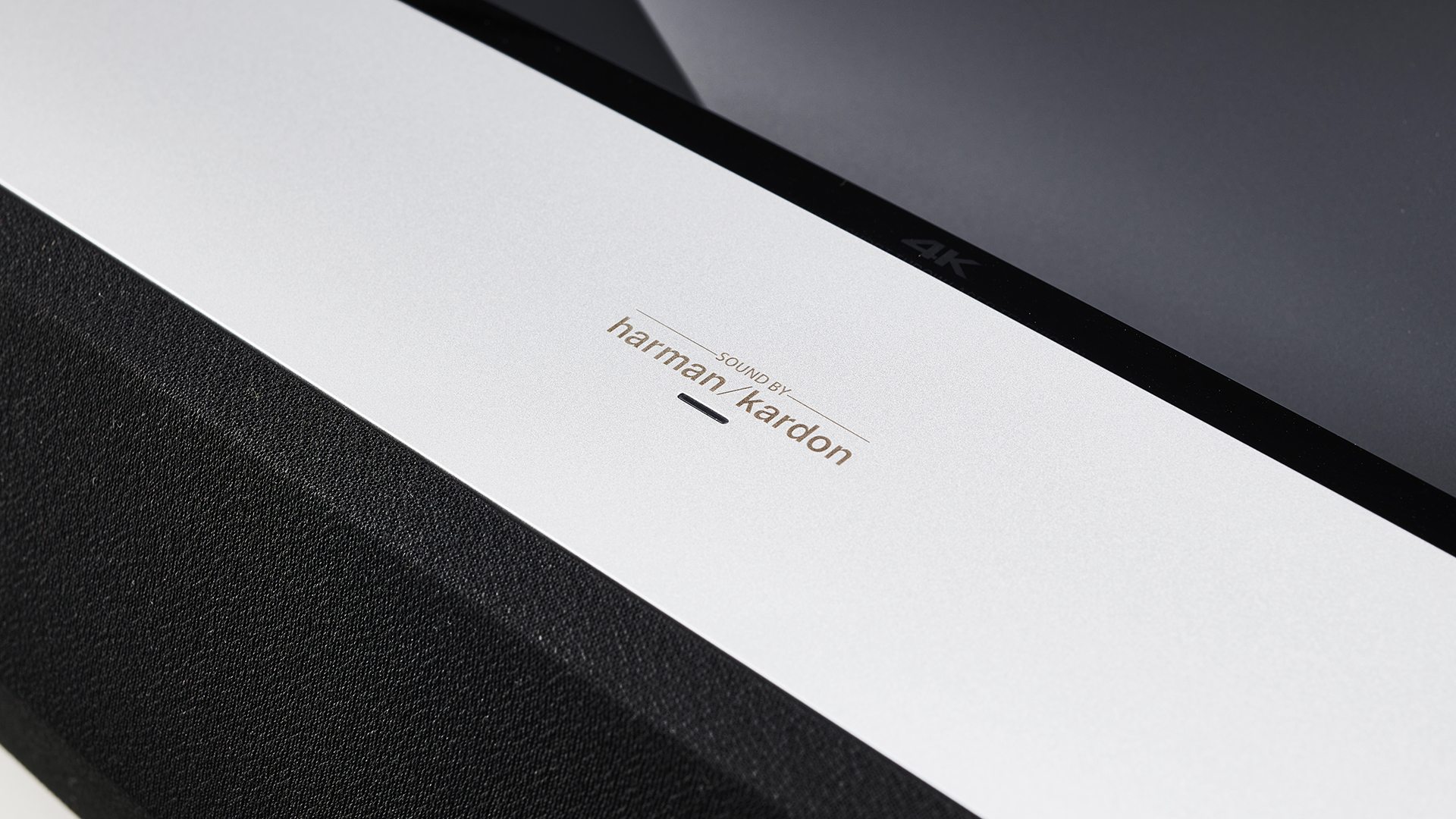
Measuring 61 x 40 x 14cm and weighing in at a sturdy 11kg, it’s pretty likely you’ll want to leave the Aura in position even when not in use, rather than constantly manhandle it into and out of a cupboard. Fortunately, while this projector is large, it’s been elegantly designed in a combination of silver and black with a convex body that’s neither technically austere nor luxuriously ‘lifestyle’ in its appearance.
The remote is similarly styled in sleek two-tone. It’s minimal, offering quick access to critical functions with a dedicated focus button at the bottom. It’s a minor annoyance that the button for the main settings is located very close to the one that activates Google Assistant – due to the lack of backlighting, it can result in a few tedious false pushes when calibrating.
Across the front of the projector, a fabric mesh covers the Aura’s four Harman Kardon speakers (powered by 15W of amplification), capable of handling DTS HD, DTS Studio Sound and Dolby Audio. Maybe we’ve been conditioned to expect the worst from in-built projector speakers, but we’re pleasantly surprised to discover that the Aura delivers a warm, room-filling sound similar to that of a decent-sized budget soundbar. While it doesn’t leave us scrambling for an alternative, if you wish you can enhance it by connecting an external system via either HDMI ARC, optical, 3.5mm headphone jack (which mutes the internal speakers) or Bluetooth – though it's worth noting that there’s no setting to adjust audio delay.
It’s possible to stream content directly to the Aura using Bluetooth or Chromecast; however, those tempted to use it as a wireless speaker when not projecting should be warned that its internal processing, while competent enough when handling film sound, can add unwelcome, muddy reverb that's quite pronounced when just listening to music.
Alongside the single HDMI ARC, the rear panel houses two additional HDMI 2.0 ports capable of handling 4K signals at up to 60Hz with support for HDR10, HDCP 2.2 and 3D content (which needs to be activated in the menu). There are also three USB 2.0 inputs and an ethernet connection.
Unlike the Samsung Premiere, the Aura doesn’t have an internal TV tuner, but with its wi-fi connection and Android TV 10 OS, it offers access to most major streaming services, including Disney Plus, HBO Max and Amazon Prime Video. Despite appearing as an available app, Netflix is not supported, nor are popular UK-specific TV apps such as iPlayer or All 4. This issue would be easy enough to work around by adding a dedicated video streamer, but you shouldn't have to.
With a maximum screen size of up to 150 inches, the Aura is made for those who worship at the altar of the big screen and is most likely to be used specifically for movies rather than as a TV replacement. It doesn’t have native 4K support, but it uses Expanded Pixel Resolution (XPR) technology to cycle each pixel through four slightly shifted positions to create those 3840 x 2160 pixels.
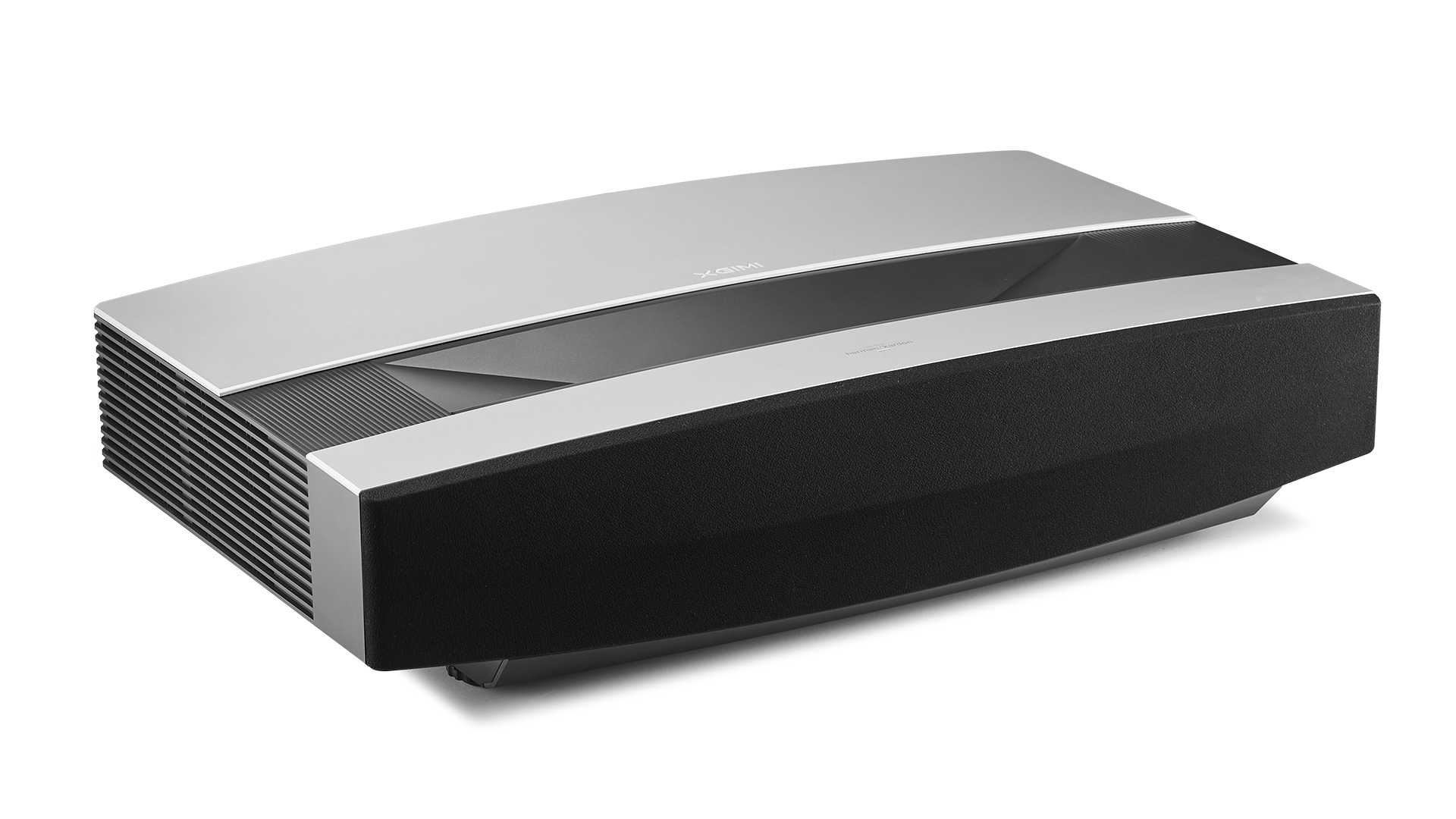
Processor MT9629 CPU, DLP 0.47" DMD chip
Light source Phosphor ALPD laser
Brightness 2500 lumens
Resolution 4K UHD (3840 x 2160) achieved using XPR pixel shifting
Aspect ratio Auto,16:9, 4:3, Original Size
Screen size 80-inch to 150-inch
Projection Image (lens to wall): 150-inch at 44cm; 80-inch at 11cm
Lens shift None
HDR HDR 10
Casting Chromecast
Inputs HDMI 2.0 x 3 (1 ARC), USB x 3
3D built-in Yes
Light source life in high brightness 25,000 hrs
Sound output 4 x 15W Harman Kardon speakers, ARC, SPDIF, Bluetooth
Fan noise (bright) 30dB
Dimensions (hwd) 610 x 400 x 140cm
Weight 11kg
The Aura uses a phosphor ALPD laser source which, according to Xgimi, produces up to 2400 lumens of brightness with a life expectancy of up to 25,000 hours, or four hours a day for 17 years. To protect users from eye damage, there’s an automatic light dimmer that uses sensors to quickly dim the laser if you get too close. This feature is incredibly sensitive and makes it rather tricky to line up the projector image by physically altering its position.
Colours are produced using a colour wheel, and Xgimi claims it achieves a gamut of 90 per cent of BT.709 and 80 per cent of DCI-P3. As is often the case with projectors that use a colour wheel, those sensitive to it will notice some rainbow artefacts, though they don’t prove to be very pronounced or distracting during testing.
Projecting onto our 8-foot reference screen from a distance of 17cm, we initially find it tricky to position the hefty Aura on its adjustable feet to get the image to line up. However, after a bit of trial and error, we're able to get the picture sized perfectly. In awkward spaces, users can make a gridded 8-point keystone setting to get things lined up, but caution should be used here: while easier than sizing using placement, it distorts the integrity of the pixels.
Focusing using the electronic calibration wheel is pretty straightforward. Still, it feels like it falls slightly short in terms of crispness, and the projector's default settings seem to attempt to compensate for this by overly sharpening the image. In general, we found that options to calibrate and refine the image were limited across the menu.
The Aura offers five default picture modes: Movie, Football, Office, Game and Custom; however, only Custom and Game offer options to further adjust settings. It’s also worth noting that HDR is either on or off and, when on, will use whatever settings you apply to SDR content.
Picture
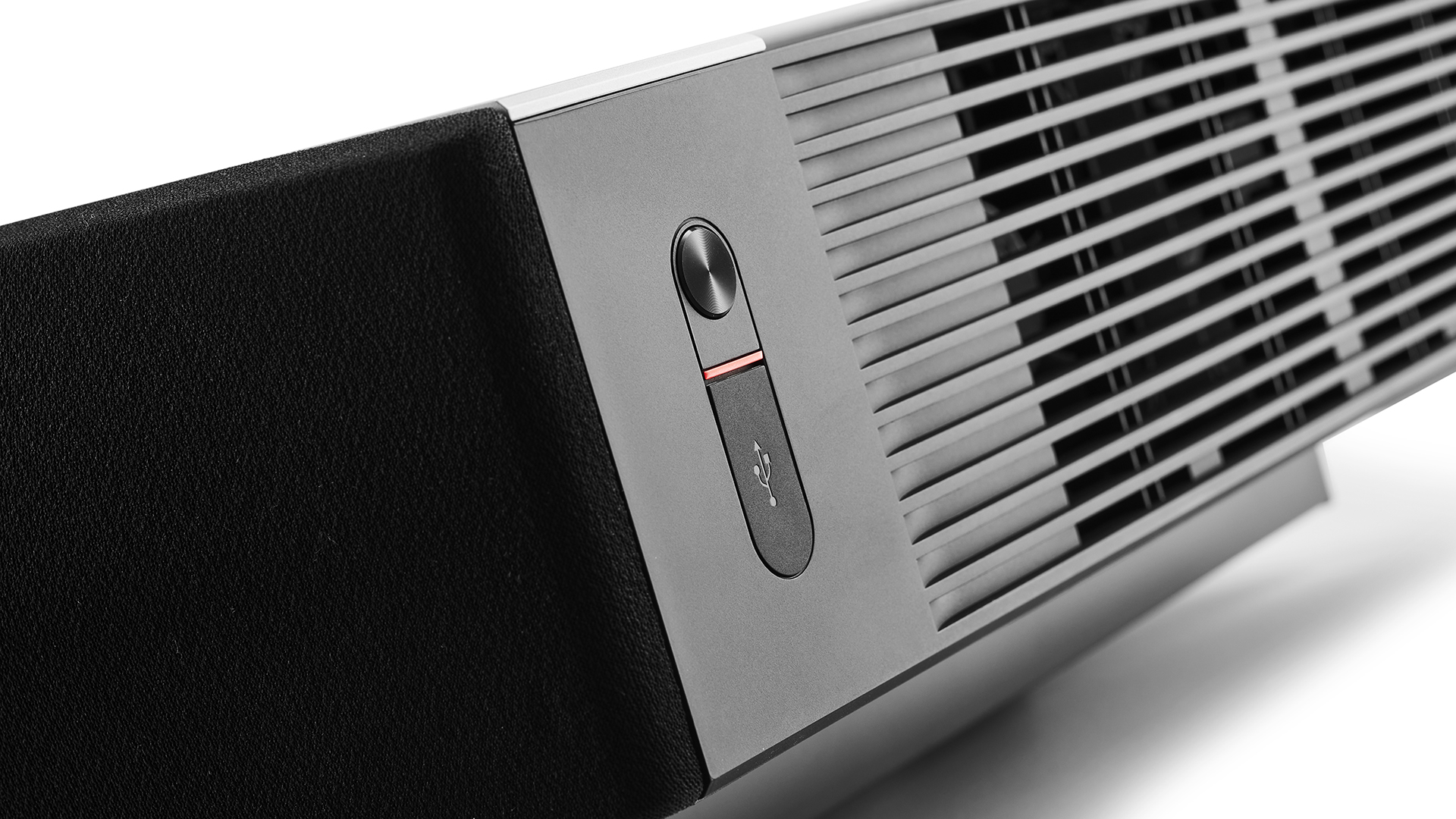
Starting with the Blu-ray of Ready Player One in Custom mode, we find that the image is relatively noisy, with particularly noticeable speckling on the grey sheen of the Sixers' uniforms. Even when a projector may have limited calibration options, it always pays to take a bit of time over them and, with a bit of tweaking, we’re able to refine the image substantially.
The Aura isn’t the most subtle and authentic when it comes to colours, but the opening race scene in the rusted neon wasteland of New York, which features both natural and artificial elements, feels true to life and vivid. The motion of the vehicles is handled well out of the box, and there’s minimal juddering as the cars fly past each other. There is a Motion Compensation setting that can be applied in levels of strong, medium or weak but, while it generally works well, our preference is to turn this off entirely for a slightly more juddery but less overtly processed image.
Switching to the opening of No Time To Die, the Aura differentiates details well within the snowy, all-white Norwegian landscape. As the figure of Lyutsifer Safin appears on the horizon the image feels solid and precise with a sophisticated level of depth, despite the gleaming brightness.
When the action moves to Southern Italy, the colours feel mostly authentic, although skin tones are just a touch overcooked, giving Daniel Craig a slightly leathery look when compared to those produced by the Epson TW9400.
The golden hour light as Bond drives Madeleine back to the hotel produces some nicely controlled highlights, but in the darker scenes of hilltop town Matera, it's apparent that the Aura, as expected, doesn’t have exceptionally detailed blacks. While dark areas such as the long shadows of the buildings and the bell boy's uniform are reasonably dense, there’s little subtlety to be found within them. Despite this, it’s still an arresting and dramatic picture complemented by a decent sound system that gives threatening weight to the gunshots and explosions that ensue shortly after.
With SDR content such as Frasier and Big on Apple TV, there is noticeably less punch to the colours, but the upscaling produces an uncluttered, bright, accurate representation that doesn’t require a whole new batch of settings to be immediately enjoyable to watch.
Verdict
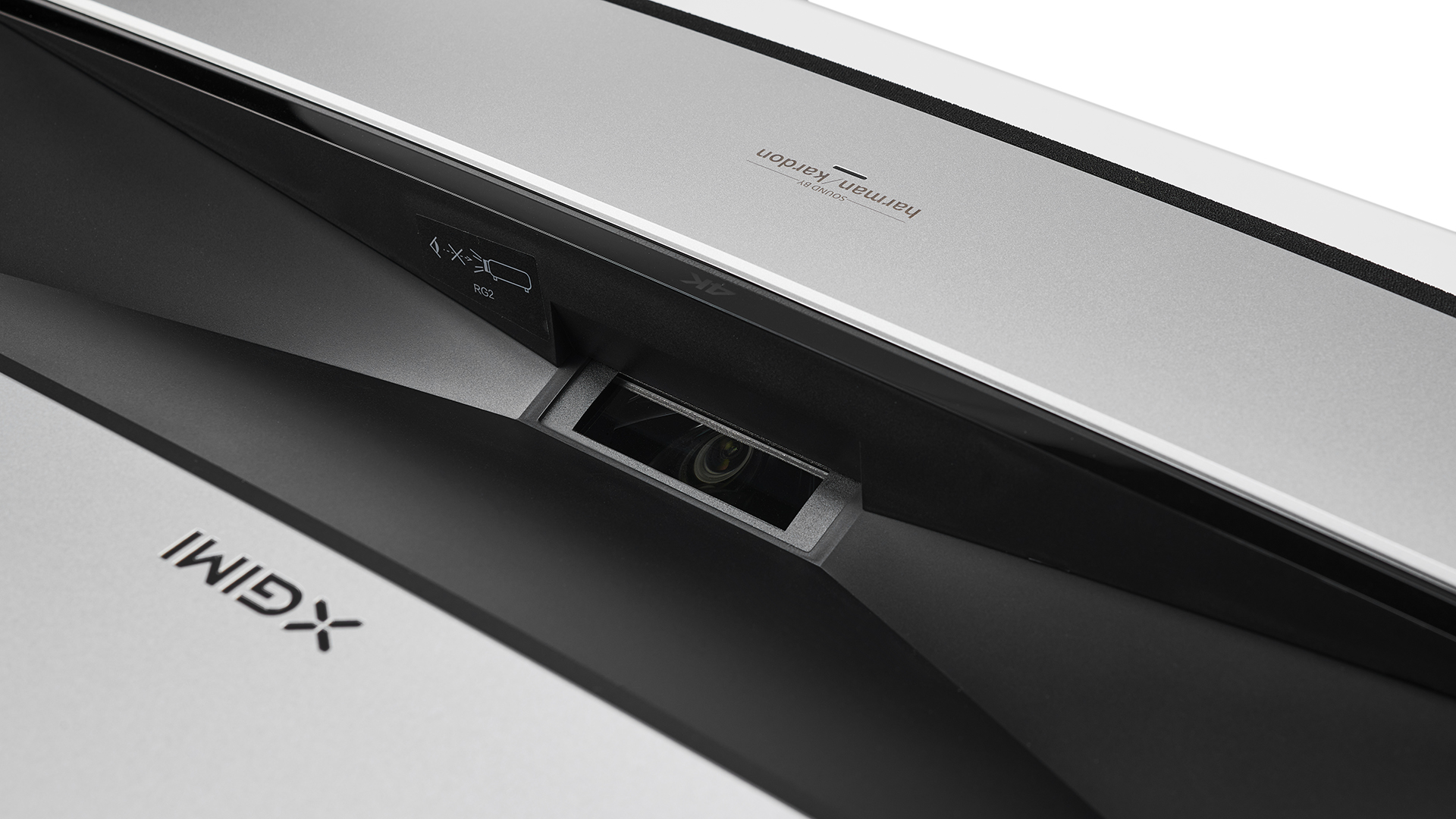
For serious home cinema fans for whom crisp, detailed textures and deep but detailed blacks are non-negotiable, the limitations of a UST projector will always be a big turn-off – so if you take pleasure in ploughing through menus fine-tuning image quality, the Xgimi Aura is likely not for you.
That said, it's hard to imagine not being thoroughly entertained by this product. It throws big with a dramatic, vibrant picture bolstered by streaming smarts and the best quality sound system we’ve yet to hear in any projector. It may be bulky, but if it fits into your home, the Xgimi Aura offers a quality UST performance that undercuts its competition.
SCORES
- Build 5
- Picture 4
- Features 4
MORE:
Read our review of the Epson TW9400
Also consider the BenQ V6050
Best projectors 2022 with Full HD, 4K, portable and short throw
What Hi-Fi?, founded in 1976, is the world's leading independent guide to buying and owning hi-fi and home entertainment products. Our comprehensive tests help you buy the very best for your money, with our advice sections giving you step-by-step information on how to get even more from your music and movies. Everything is tested by our dedicated team of in-house reviewers in our custom-built test rooms in London, Reading and Bath. Our coveted five-star rating and Awards are recognised all over the world as the ultimate seal of approval, so you can buy with absolute confidence.

